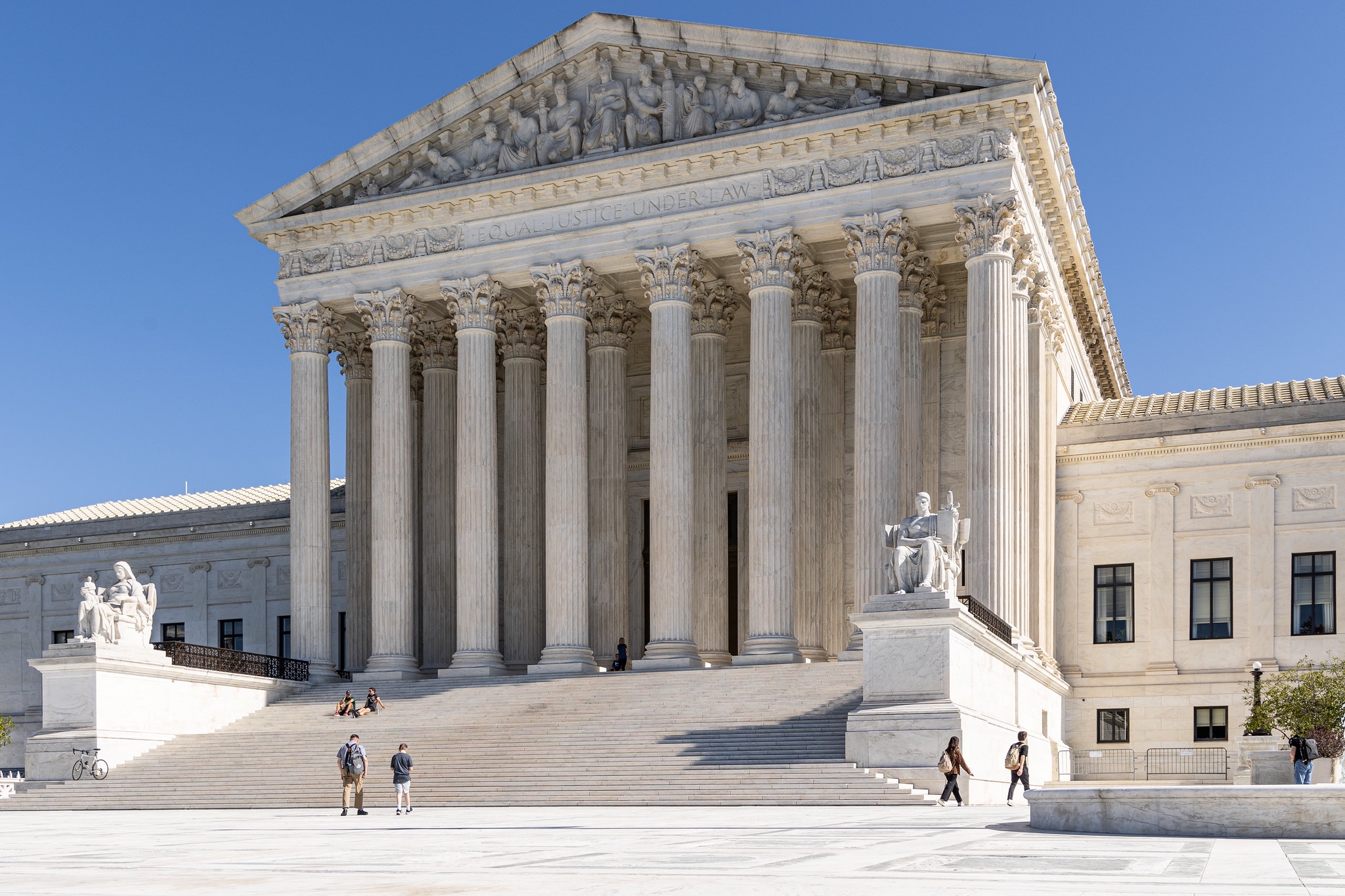During the 2024-25 term, the court was unanimous 42% of the time in its Opinions of the Court. In the remaining 58% of such cases, the justices’ dissents were typically restrained and mundane.
In a small number of cases, however, the dissents were somewhat more … critical. Now that the term is over, I thought it would be valuable, both from a historical and, well, human, perspective, to highlight some of the more eye-opening dissents of the term and share a few observations on the court’s most (and least) prolific dissenters.
— So let’s begin with taxes. At least on the surface, Commissioner of Internal Revenue v. Zuch could not be more boring (apologies, Ms. Zuch). As we wrote in our opinion analysis, the issue before the court in Zuch was “whether a tax court has jurisdiction to hear a taxpayer’s appeal of a proposed levy to collect unpaid taxes once imposing a levy is no longer an option because the taxes have been paid in full.” In an 8-1 decision, Justice Amy Coney Barrett answered in the negative: Because “there was no longer a proposed levy, the Tax Court properly concluded that it lacked jurisdiction to resolve questions about Zuch’s disputed tax liability.”
But the lone dissenter, Justice Neil Gorsuch, added some spice to a seemingly abstruse subject. In Gorsuch’s view, the case did not simply concern a narrow question of jurisdiction, but the sheer power of the IRS (a subject about as relatable as it gets). According to Gorsuch, by deciding the way it did, the court’s decision “hand[ed] the IRS a powerful new tool to avoid accountability for its mistakes” and allowed it to keep more taxpayer money “than it is lawfully due.” As a legal matter, I’m not sure I necessarily agree with Gorsuch’s impassioned dissent. I most certainly agree with it as a taxpayer, however.
— The court decided a considerably more serious issue in Gutierrez v. Saenz. In 1998, Ruben Gutierrez was convicted of the murder of 85-year-old Escolastica Harrison. In 2020, Gutierrez brought a federal civil rights claim against both the district attorney and police chief responsible for his prosecution, arguing that he was entitled to obtain DNA testing, which, according to him, would clear him of the murder. In a 6-3 opinion written by Justice Sonia Sotomayor, the court allowed Gutierrez’s claims to move forward and for him to potentially receive that testing.
Both Justices Clarence Thomas and Samuel Alito penned dissents. Thomas was clearly displeased, writing that the court’s “intervention serves no purpose other than to exacerbate the already egregious delays endemic to capital litigation.” But Alito’s principal dissent, joined by Thomas and Gorsuch, is perhaps the more noteworthy. Dropping the court’s tradition of dissenting “respectfully,” Alito provided a litany of areas where the majority had supposedly gone wrong, from its misapplication of Supreme Court precedent to its disrespect of the U.S. Court of Appeals for the 5th Circuit to its painting of a “misleading picture of underlying facts and Gutierrez’s decades-long litigation campaign.” As Alito concluded, using language to describe the majority opinion typically applied to those who assist in the commission of a crime, the “decision’s only practical effect will be to aid and abet Gutierrez’s efforts to run out the clock on the execution of his sentence. And if the decision is taken seriously as a precedent on Article III standing, it will do serious damage. I therefore dissent.”
— Similar to Zuch, the case of Diamond Alternative Energy LLC v. v. EPA did not feature an issue that, at first blush, would seem likely to encourage fervent disagreement. As we described in an opinion analysis only slightly more exciting than the one for Zuch, this case rested on Article III standing (that is, whether there is a legal right to sue in federal court); specifically, whether fuel producers could sue the EPA over that agency’s approval of “California regulations that aim to decrease emissions by requiring the production of more electronic vehicles and fewer gas-powered vehicles.” In a 7-2 decision by Justice Brett Kavanaugh, the court answered yes.
Justice Ketanji Brown Jackson, dissenting alone, was not having it. Like Gorsuch in Zuch, Jackson understood the case as being about far more than whether the parties could overcome a certain procedural hurdle. To the justice, it was about what particular categories of plaintiffs could sue in the first place. And on this count, she believed her fellow justices had chosen to favor those with resources over those without. In Jackson’s words, “[t]his case gives fodder to the unfortunate perception that moneyed interests enjoy an easier road to relief in this Court than ordinary citizens.” Jackson ended her dissent with a warning: Although “[t]ime will tell if today’s decision portends a broader shift in the Court’s view of Article III standing for all litigants,” if it does not, the court’s “decisions will come to represent, like so many marble facades, another mere facsimile of justice.”
— Because it has likely been written about more than any other case this term (including on this website), I am not going to dwell on the majority decision in Trump v. CASA. But for those of you living in a cave (or woefully ignorant of SCOTUSblog until reading this article), the court, in a 6-3 decision written by Barrett, nixed district judges’ abilities to issue universal injunctions – that is, to broadly prohibit the government from enforcing a law or policy (such as Trump’s birthright citizenship order) against nonparties to a case.
All three of the court’s Democratic appointees dissented, contending that the majority had effectively kneecapped the judiciary in favor of the executive branch. Along these lines, considerable attention has been paid to Jackson’s solo dissent, which accused the majority of furthering “an existential threat to the rule of law.” In turn, this invited a cutting remark from Barrett, in which she suggested that Jackson “decries an imperial Executive while embracing an Imperial Judiciary.” But those seeking fervid disagreements, however, need look no further than Sotomayor’s principal dissent. Neglecting, like Alito in Saenz, the “respectfully” part, Sotomayor accused the court of the following judicial abuses:
“[S]hamefully” “play[ing] along” with the government’s “gamesmanship”;
Creating a “new legal regime,” in which “[n]o right is safe”;
Launching a “grave” “attack on our system of law”;
Ignoring the deeper issue in play, which is “whether the President’s Executive Order is constitutional”;
Writing a “self-refuting” opinion;
Stymying “the Judiciary’s authority to stop the Executive from enforcing even the most unconstitutional policies”;
Issuing an order that “will cause chaos for the families of all affected children” and which may even “wrench newborns from the arms of parents lawfully in the United States”; and
Providing “an open invitation for the Government to bypass the Constitution”
Sotomayor’s most powerful line came at the opinion’s end. She concluded that, “[w]ith the stroke of a pen, the President has made a ‘solemn mockery’ of our Constitution: Rather than stand firm the Court gives way. Because such complicity should know no place in our system of law, I dissent.”
— United States v. Skrmetti has garnered nearly as much attention as Trump v. CASA, and I therefore won’t belabor the majority’s holding. In a 6-3 opinion written by Chief Justice John Roberts, the court upheld Tennessee’s prohibition on puberty blockers and hormone therapy for transgender minors.
As in CASA, the three Democratic appointees dissented, with Justices Sotomayor and Elena Kagan writing. Perhaps unsurprisingly (see below), Kagan’s opinion was short and restrained, recommending that the case be sent back to the lower court for further review. Sotomayor was not so inhibited. According to the more senior justice, “[b]y retreating from meaningful judicial review … the Court abandon[ed] transgender children and their allies to political whims.” Even more pointedly, Sotomayor criticized the court for allegedly authorizing, “without second thought,” the infliction of “untold harm to transgender children and the parents and families who love them.” But perhaps equally notable was her statement at the dissent’s beginning: “In sadness, I dissent.”
— Despite the abundance of charged rhetoric in CASA and Skrmetti, I think the most intense dissent of the term belongs (yet again) to Sotomayor in the emergency docket case of Department of Homeland Security v. D.V.D.. In an unsigned order, the D.V.D. majority paused a district court ruling that had prevented a group of immigrants from being sent to South Sudan, where they could potentially face torture.
Sotomayor, joined by Kagan and Jackson, vigorously dissented. As the justice began, “[i]n matters of life and death, it is best to proceed with caution.” In Sotomayor’s view, the government “took the opposite approach,” and the court was now essentially blessing what she saw as a grievous abuse of executive power in a single paragraph. Sotomayor then provided a 19-page analysis of where the court had seemingly gone wrong. And whether one agrees with it or not, there is little doubt that her conclusion provided the most powerful words of the entire term, as well as a stark reminder that the court’s decisions carry real-world consequences: “Apparently, the Court finds that idea that thousands will suffer violence in farflung locales more palatable than the remote possibility that a District Court exceeded its remedial powers when it ordered the Government to provide notice and process to which the plaintiffs are constitutionally and statutorily entitled. That use of discretion is as incomprehensible as it is inexcusable. Respectfully, but regretfully, I dissent.”
These dissents also contained some noteworthy lines:
— Thomas in Glossip v. Oklahoma: “The Court’s decision distorts our jurisdiction, imagines a constitutional violation where none occurred, and abandons basic principles governing the disposition of state-court appeals.”
— Alito in Hewitt v. United States: “Animating the Court’s atextual interpretation is a thinly veiled desire to march in the parade of sentencing reform. But our role is to interpret the statute before us, not overhaul criminal sentencing.”
— Sotomayor in Mahmoud v. Taylor (sans a “respectfully”): “The reverberations of the Court’s error will be felt, I fear, for generations. Unable to condone that grave misjudgment, I dissent.”
— Sotomayor in Riley v. Bondi: “Not long ago, this Court described delays in regulatory approvals of construction projects as ‘borde[ring] on the Kafkaesque.’ In holding that Riley was required to file his appeal 16 months before the order he sought to challenge existed, the Court surely moves from the border well into the heartland of illogic and absurdity.”
— Thomas in Velazquez v. Bondi: “[T]he majority reaches the merits after finding jurisdiction based on a flawed theory of its own creation.”
And my favorite (especially because I clerked on a district court):
— Alito in Esteras v. United States: “Veteran trial judges often complain that their appellate colleagues live in a world of airy abstractions and do not give enough thought to the practical effects of their holdings. Today’s decision is likely to earn the rank of Exhibit A in the trial bench’s catalog of appellate otherworldliness.”
Some larger observations:
— Based on the numbers alone, the great dissenter of the Roberts court this term was Jackson, who wrote 10 dissents in Opinions for the Court. Jackson was closely followed by Thomas, who had nine written dissents. Because Jackson was in dissent more than any other justice this term (at 28%), it is unsurprising that she penned so many written dissents. The same cannot be said for Thomas, however, who was in the majority 78% of the time (equal to Alito, Sotomayor, and Gorsuch). So what does this tell us about Thomas? Whether he wins, loses, or ends up somewhere in between, he will most certainly speak his mind (both in writing, and, these days, in the courtroom).
— The weakest dissenter of the Roberts Court was Roberts himself, who did not pen a single dissent (or, for that matter, a concurrence). I think one can conclude numerous things from this, but principally among them are that (1) Roberts felt awfully confident this term (which makes sense, given that he was in the majority more than any other justice – 95% of the time); (2) Roberts continues to really try and encourage the whole “I’m a institutionalist-first, then an individual justice“ ethos; and (3) relatedly, the chief really wants to go along to get along (as unfathomable as that may be in the current political climate).
— Although he wrote some top-notch concurrences, the most boring dissenter award (well, other than Roberts) goes to Kavanaugh (not necessarily a bad thing!). Indeed, the justice only penned two dissents, in Medical Marijuana, Inc. v. Horn,and in Laboratory Corporation of America v. Davis. As for Medical Marijuana, Kavanaugh’s dissent was well-reasoned, thorough, and quite convincing; but other than a few lines about the majority’s decision producing “significant confusion and litigation in the lower courts,” there are few fireworks to be found. As noted, Kavanaugh also dissented in Laboratory Corporation, a case that the court dismissed as improvidently granted (that is, determining it should not have been taken up in the first place). Dissents in such cases are rather rare, and Kavanaugh should get some credit for that alone. But the actual dissent is about as judicious (i.e., boring) as it gets.
— They are wonderful writers, but Barrett and Kagan were not particularly fierce in their dissents this term (once again, not necessarily a bad thing). This is not surprising coming from Barrett, who once described herself – given her penchant for “rather restrained rhetoric” – as a “one jalapeño gal” (though, as noted above, she surely increased that jalapeño count in her exchange with Jackson in CASA). A bit more surprising was Kagan, who, in the past, has not held back when the mood so strikes her (see, for example, her dissent in Loper Bright Enterprises v. Raimondo). My dime-store speculation? This may reflect the justice’s much publicized (though perhaps overstated) “move to the middle” this term, and with it some hesitancy to potentially alienate her more conservative colleagues.
— I have an admittedly soft spot for Gorsuch. But (other than in Zuch) he also didn’t really cause much excitement this term, at least dissent-wise. Although Gorsuch authored seven dissents – putting him in third place on that front – these lacked some of the passion we’ve come to expect from the Colorado justice. Indeed, even in FCC v. Consumers’ Research – where I was expecting an absolute barnburner regarding the Supreme Court’s treatment of the non-delegation doctrine (that is, the extent to which Congress can outsource its lawmaking powers to other entities) – Gorsuch’s dissent was quite technical and a bit tame (he even admitted at one point that “things could be worse”). Here’s (perhaps) hoping the Gorsuch of Gundy v. United States, which declared “delegation [was] running riot,” will soon return.
— Despite the unbridled passion of certain dissents this term, I still think they pale in comparison to some of those in years past. While accusing the court of enabling an existential threat to the rule of law, as Jackson did in CASA, is not particularly complimentary, it does not personally attack any individual justices. This has not always been the case. Although a variety of examples come to mind, the nastiest I can think of in recent memory came from Justice Antonin Scalia in Obergefell v. Hodges, in which (again, for those of you living under a rock) the court recognized a constitutional right to gay marriage. Responding to Justice Anthony Kennedy’s grand rhetoric in Obergefell, Scalia made clear that, if the price to be paid for a fifth vote entailed joining such language, “I would hide my head in a bag.” He then continued that the court had “descended from the disciplined legal reasoning of John Marshall and Joseph Story to the mystical aphorisms of the fortune cookie.” (In that vein, I welcome readers to point me to the absolutely nastiest dissents out there, which I’d be happy to explore in a future column.)
— Although the Democratic-appointed justices are often accused of favoring opinion outcomes over legal principles, this is not borne out by some of this term’s dissents. It is true that, in cases like Skrmetti, Diamond Alternative Energy, and D.V.D., the liberal justices considered the real-world consequences of the majority’s decisions. But Alito (and Thomas) did the same in Gutierrez, decrying the policy effects that the majority’s decision would have on capital litigation. And Gorsuch explicitly considered the real-world effects of the lead opinion in Zuch and, with it, the prospect of an IRS run rampant.
— Making future predictions is a mug’s game, but based on her sheer number of dissents, Jackson has become the lead liberal dissenter of the Roberts court. At the same time, Sotomayor’s dissents were, I think, the most passionate, as reflected by the cases explored above. Whether either justice will hit Justice William O. Douglas levels of progressivism remains to be seen, but both are at the very least approaching Justice William J. Brennan territory.
Posted in Featured, Merits Cases
Recommended Citation:
Zachary Shemtob,
The most intense dissents of the term,
SCOTUSblog (Jul. 21, 2025, 12:17 PM),
https://www.scotusblog.com/2025/07/the-most-intense-dissents-of-the-term/




























